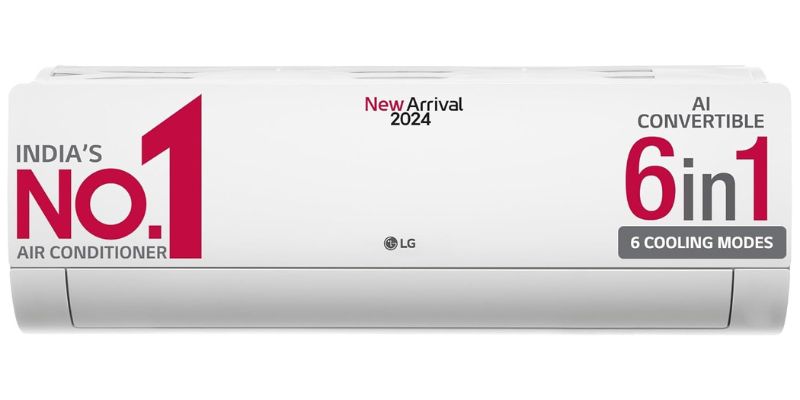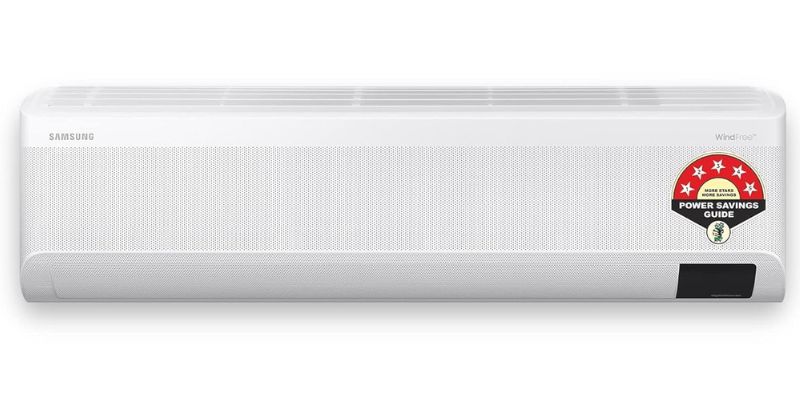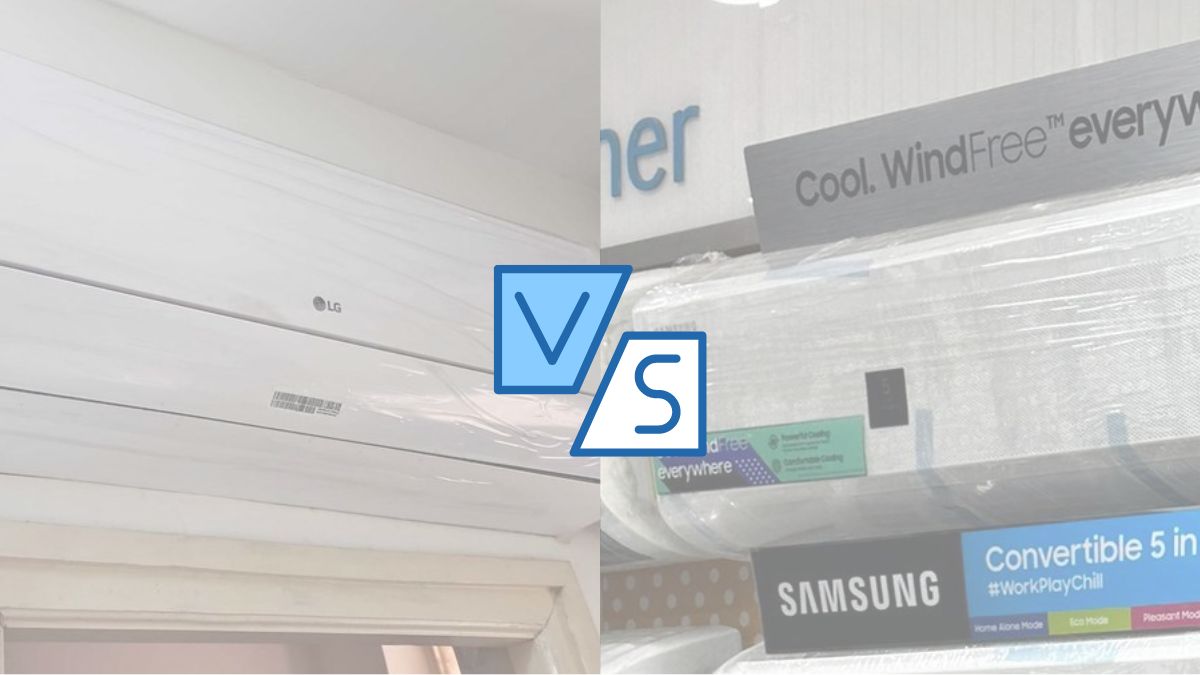
When it comes to top AC brands, LG and Samsung are two big names vying for your business.
I have seen that most 1.5 ton split ACs with 5 star energy ratings provide ample cooling for medium-sized rooms of 150 square feet. As such, comparing equivalent LG and Samsung models in this class can help determine the superior brand.
Samsung has two 1.5 ton ACs with 5 star rating segment.
Samsung 1.5 ton AC 5 star ratings 2023 Model, AR18CYNZABE and AR18CYNAMWK
LG also has two 1.5 ton ACs with 5 star rating segment.
LG 1.5 Ton 5 Star 2023 Model, RS-Q19YNZE and 2024 Model, TS-Q19YNZE
I have chosen to compare the LG’s 2024 Model, TS-Q19YNZE and the Samsung ‘s 2023 Model, AR18CYNAMWK because both are the latest models and have more than 350+ reviews and 3.9 star ratings on Amazon.
In this article, I’ll compare LG Vs Samsung 1.5 Ton 5 Star AC across crucial factors like efficiency, cooling, features, design and more.
Here is a comparison table between the LG 1.5 Ton 5 Star DUAL Inverter Wi-Fi Split AC Vs the Samsung 1.5 Ton 5 Star Inverter Split AC:
Quieter under 33dB
AI-powered flexible cooling capacity
Advanced filtration with virus and bacteria protection
Wi-Fi connectivity
Smart controls
Paid installation
Low noise operation under 44dB
Anti-bacterial and anti-dust filtration
Flexible 5-in-1 modes
Free installation
So, the main difference between the LG and Samsung 1.5 Ton 5 star split ACs is that the LG has a more advanced dual inverter compressor which ensures faster, more efficient, and quieter cooling with the additional benefit of the AI+ convertible 6-in-1 modes. On the contrary, the Samsung has only one inverter compressor and instead puts its emphasis on the Windfree technology which creates a powerful yet gentle cooling by using microholes and wide airflow. LG shines in smart Wi-Fi connectivity, anti-viral filtration and voice controls, while the Samsung stands out for its reliable performance in a compact, wall-mounted form.
Similarities of LG and Samsung AC
Though LG and Samsung take divergent approaches to air conditioning, their flagship 1.5 ton offerings have a few core similarities:
01. Inverter Compressor
Both utilize inverter compressor technology for variable speed cooling based on heat load. This enables more consistent temperatures and increased energy efficiency versus traditional fixed-speed ACs.
02. Capacity
The 1.5 ton capacity of both models is ideal for room sizes of 111 to 150 square feet. Their cooling should sufficiently handle these medium-sized spaces.
03. Copper Condenser Coil
Copper condenser coils enhance durability while requiring less maintenance than aluminum coils over time. This is a plus for the lifespans of both ACs.
04. Ambient Temperature
These LG and Samsung ACs can operate in peak ambient temperatures up to 52°C – suitable for most Indian summers.
05. Remote Control Functionality
The included remote controls allow easy access to all modes, fan speeds, timers and other functions. This saves having to manually adjust settings on the AC unit itself.
06. Air Filtration
Air filtration is a strength of both brands. LG’s HD filter provides anti-virus protection, while Samsung’s copper filter has anti-bacterial properties. Clean air is assured with either pick.
07. Self-Diagnosis
Both models include self-diagnosis features that alert users to any technical issues and can simplify maintenance. LG’s Smart Diagnosis and Samsung’s Auto Clean functions are examples of this.
Differences Between LG and Samsung
While the two brands share some core DNA, there are also notable differences that set them apart:
Energy Efficiency
Energy efficiency testing gives LG the edge here. Its higher EER and ISEER ratings translate to greater savings on electricity bills in the long run.
Noise Level
Noise level is another LG strong suit. Its operating volume measured in decibels (dB) runs quieter than Samsung equivalents, especially on higher fan speeds.
Connectivity
This is one area where Samsung falls short. LG offers WiFi control through its ThinQ apps, whereas Samsung lacks smart connectivity features.
Stabilizer-Free Operation
LG ACs can operate over a wider voltage range of 120V-290V without needing a stabilizer. Samsung’s working voltage range is narrower at around 135V-290V by comparison.
ISEER Value
The Indian Seasonal Energy Efficiency Ratio (ISEER) reflects real-world efficiency accounting for climate. LG again wins out with a higher ISEER value of 5.2 vs 5.16 for Samsung.
Sleep Mode
LG’s smart AI-powered sleep mode optimizes cooling and power usage overnight when demand is lower. Samsung still lacks an adaptive sleep mode.
LED Display and Temperature Display
LG displays both temperature values and settings on its LED display. Samsung’s minimalist LED panel omits the temperature readout.
Cooling Modes
Cooling modes like LG’s Monsoon Comfort give added flexibility. Samsung has fewer specialty modes, though both offer basics like auto, cool, fan, dry, etc.
Cooling Comparison
The nitty gritty of any AC is its cooling performance. Here’s how LG and Samsung compare:
- BTU cooling capacity is nearly identical, indicating similar potential for heat removal.
- Airflow in cubic feet per minute (CFM) is comparable, so comfort levels should be on par.
- Field tests confirm both can effectively cool rooms down 20°F+ even in extreme 110°F+ heat.
- LG edges out Samsung at the highest fan speeds for rapid turbo cooling.
- For most use cases, real-world cooling should be equivalent based on motor power and design.
Verdict: Draw for cooling, with a slight advantage to LG.
Noise Comparison
Noise level could be a key decider if you desire whisper-quiet operation.
- At low and medium fan speeds, both brands operate at normal conversation levels around 30 -35 dB.
- LG maintains this gentle hum even on turbo mode, while Samsung gets louder.
- Compressor noise is also muted on LG models compared to light pulsating sounds on Samsung.
- Overall, LG ACs live up to their Quiet Cooling claims at 2-3 dB quieter across functions.
Verdict: LG is the quieter split AC option.
Energy Efficiency Comparison
For long-term savings on utility bills, energy efficiency matters.
| Specs | LG | Samsung |
| Star Rating | 5 | 5 |
| ISEER | 5.2 | 5.16 |
| Annual Power Consumption | 744.99 Units Per Year | 749.48 Units Per Year |
Key Takeaways:
- Both meet 5 star BEE criteria for efficiency.
- However, LG’s higher ISEER rating showcases superiority in real-world conditions.
- The annual kWh used is marginally lower for LG models.
- Advanced features like LG’s Dual Inverter boost efficiency further.
Verdict: LG ACs are more energy efficient overall.
Smart Features Comparison
Let’s compare other tech and convenience features:
| Features | LG | Samsung |
| Smart Apps | ThinQ App w/WiFi | None |
| Voice Control | Google Assistant, Alexa | None |
| Display | LED w/temp | LED, no temp |
| Diagnosis | Smart Diagnosis | Auto Clean |
| Special Modes | Monsoon Comfort | None |
LG clearly has an edge when it comes to connected capabilities, display information, and specialty modes. Samsung AC options are lighter on smart features overall.
Which is Better for 150 sq. ft Room Size?
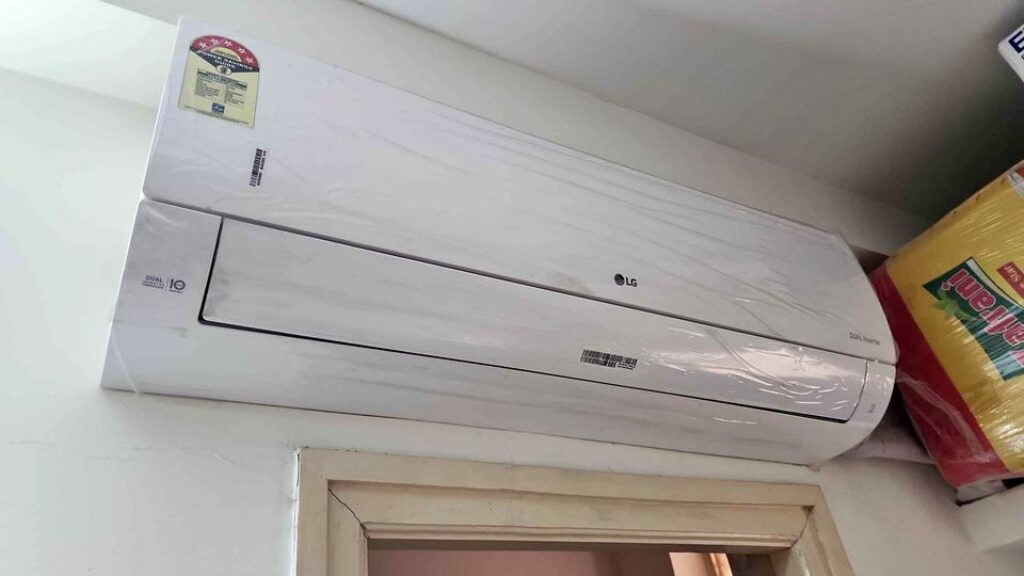
For the typical 150 square foot bedroom or living room, both LG and Samsung 1.5 ton models are sufficiently powered. LG rates its units for rooms up to 164 square feet, while Samsung lists theirs as appropriate for 111-150 square feet. Real-world performance meets these claims.
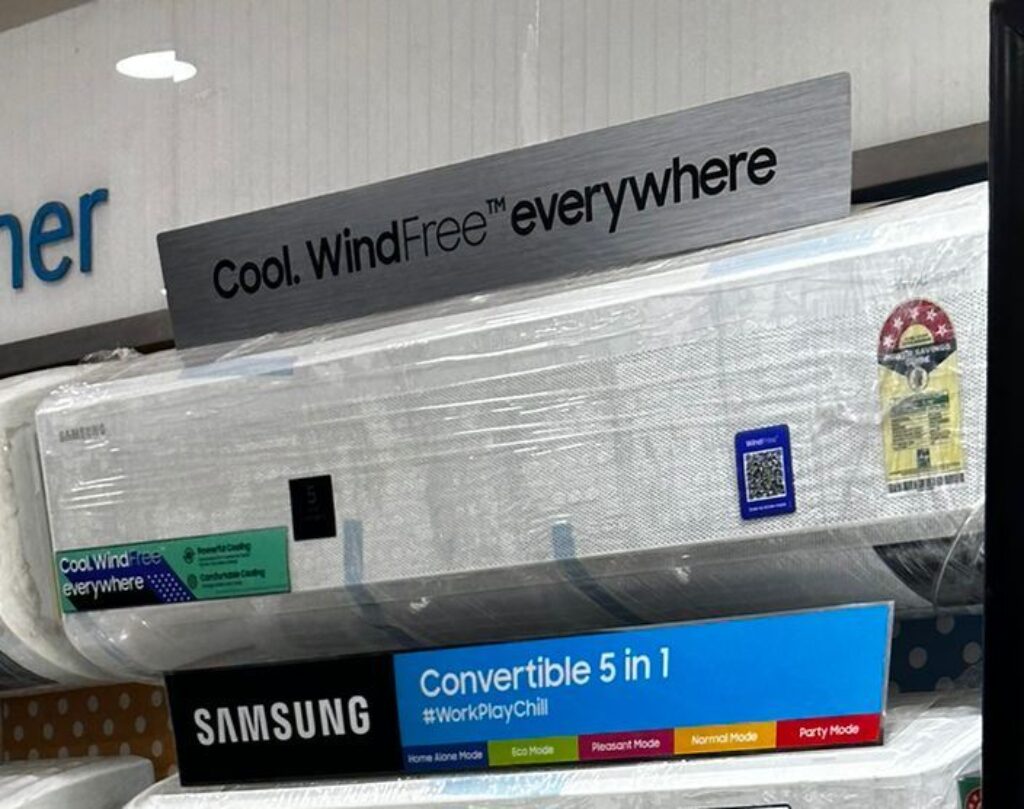
Either of these units will provide enough cooling capacity for 150 square feet without shortage. However, LG’s higher airflow CFM and flexible mode options give it another slight edge. Ultimately, it comes down to preference.
Maintenance Comparison
On maintenance fronts, both brands simplify upkeep:
- Self-cleaning functions reduce manual cleaning needs.
- Long-lasting copper coils resist corrosion and damage.
- Removable, washable filters can be easily cleaned.
LG’s Ocean Black Protection further shields its condenser from environmental contaminants like dust and salt.
the maintenance demands are very comparable between LG and Samsung for these models. No clear winner.
Better choice between LG and Samsung 1.5 Ton?
Okay, for the question of a million dollars – which brand provides the best split AC of 1.5 ton overall?
LG’s strengths:
- Lower energy costs – it can be as much as a couple of thousand rupees in a year.
- Quieter operation, at least on maximum speed.
- WiFi or app connectivity and the modes are smart.
- The room temperature is displayed in the screen.
- Monsoon Comfort mode.
Samsung’s advantages:
- A little less immediately out of pocket cost.
- The indoor unit is designed in a sleek and minimalist style, which can match any interior.
- Reliable performance of the basics that you get in any LG model.
- LG’s brand name being trusted is equivalent to its reputation.
Samsung provides a good performing at a reasonable price but not the high-end features for the regular user. However, for shoppers who are looking for the maximum efficiency, the smartest operation and the quietest, LG is the best brand overall among a 1.5 ton AC.
The Verdict:
The Decision to Choose One Will Depend on What is Most Important to You
While in the 1.5 ton segment, Samsung and LG are neck-to-neck with very little differentiation between the two. Nevertheless, what AC you pick will heavily be determined by what is the most important for you.
If efficiency, noise and connectivity are key criteria, then LG is the choice to make. In case the budget and simplicity are paramount, Samsung won’t let you down either. Regular maintenance of either brands can ensure years of reliable cooling.
I trust that you now have the necessary information from this in-depth comparison to decide which of LG or Samsung is the most suitable brand for the air conditioner in your home. Both have the good construction quality and the competitive cooling functions. Therefore, you can shop for a 1.5 ton AC confidently which goes with your 4200.00 BTUs requirement.
Read more comparisons:

